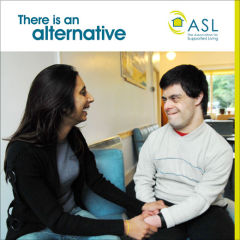A report from the Association for Supported Living (ASL) demonstrating how effective community-based support is for people with learning disabilities.
This report published by The Association for Supported Living (ASL) demonstrates that community-based support for people with learning disabilities is more effective, safer and cheaper than institutional care. The report calls for the government to act to put an end to institutional services.

There Is An Alternative includes 10 case studies of people who moved from institutional services to supported living services. In each case quality of life improved dramatically, while costs fell significantly.
There Is An Alternative was prompted by an edition of Panorama broadcast in May this year, which showed people with learning disabilities in an institution (Winterbourne View, Bristol) being abused by staff employed to care for them.
Kim Foo, chair of the ASL says:
“It is quite possible to provide high quality, cost effective alternatives to the restrictive, expensive institutional services that too many local authorities continue to purchase. We call on David Cameron and his government to finally put an end to the abuse of some of our society's most vulnerable members.”
Writing in the report’s foreword, Professor David Sines CBE says:
“This inspiring report provides optimism for the future and exposes the deficits that continue to imbue existent specialist hospital services that perpetuate an institutional model of care delivery.”
The Association for Supported Living is a not-for-profit organisation that represents organisations that support about 30,000 people with learning disabilities, with combined annual budgets approaching £1 billion.
The publisher is The Association for Supported Living (ASL).
There is An Alternative © The Association for Supported Living 2011.
All Rights Reserved. No part of this paper may be reproduced in any form without permission from the publisher except for the quotation of brief passages in reviews.
disability, housing, intellectual disabilities, social care, England, Paper